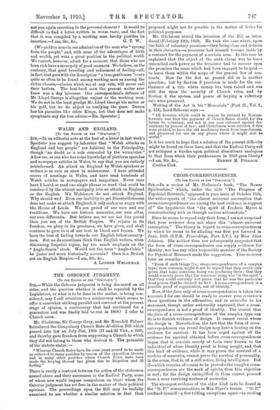THE OSBORNE JUDGMENT.
[To THE EDITOR OF THE "SPECTITOR.'] SIB,—While the Osborne judgment is being discussed on all sides, and the question whether it shall be repealed by the Legislature, or what is to be done in the matter, is being con- sidered, may I call attention to a controversy which seems to offer a somewhat striking parallel and contrast at the present stage of opinion, a controversy that had continued for a generation and was finally laid to rest in 1868? I refer to
Church rates.
Mr. Gladstone, Sir George Grey, and Sir Roundell Palmer Introduced the Compulsory Church Rate Abolition Bill which passed into law on July 31st, 1868 (31 and 32 Viet., c. 109),
and thereby gave freedom from supporting a Church to which they did not belong to those who desired it. The preamble of the statute states :- "Whereas Church Rates have for some years ceased to be made or collected in many parishes by reason of the opposition thereto and in many other parishes where Church Rates have been made the levying thereof has given rise to litigation and ill fee/jag."
There is surely a contrast between the action of the statesmen named above and their successors in the Radical Party, some of whom now would impose compulsion on those whom the Osborne judgment has set free in the matter of their political opinions. The proceedings upon the Bill may be usefully examined to see whether a similar solution to that then proposed might not be possible in the matter of levies for political purposes.
Mr. Gladstone stated the intention of the Bill as intro- duced (February 19th, 1868). He took the case where, upon the faith of voluntary promises—they being clear and definite in their character—a treasurer had himself become liable by a contract for the payment of a certain sum. In this case he explained that the object of the sixth clause was to leave untouched such power as the treasurer had to recover upon the promises the sums which had been engaged to be paid,— to leave them within the scope of the general law of con- tracts. How far the Act as passed did so is another question ; but by Section 3 provision is made for the con- tinuance of a rate where money has been raised and was
still due upon the security of Church rates, and by Section 6 the system and power of levying a voluntary
rate were preserved.
Writing of the Act in his " Memorials " (Part II., Vol. L, p. 124), Lord Selborne says :—
"All however which could in reason be claimed by Noncon- formists was that the payment of Church Rates should for the future be voluntary, and not in any case enforced against dis- sentients by process of law ; and Churchmen were entitled, if this were yielded, to have the old machinery freed from impediments, and preserved for use in any places where it might still be useful."
Is it too much to hope that a solution of the present difficulty might be found on these lines, and that the Radical Party will
not reimpose a burden upon political dissentients analogous to that from which their predecessors in 1868 gave liberty?
Carlton Club.


































































 Previous page
Previous page